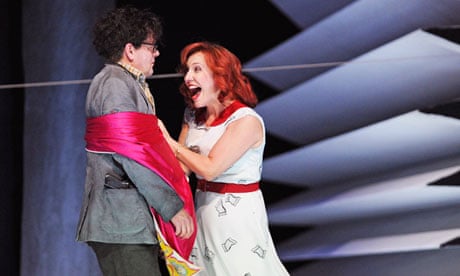Loss of memory, the subject of Martinu's 1938 opera Julietta, ranks as one of art's most ancient and nightmarish preoccupations. From the Epic of Gilgamesh, which the Czech composer later set to music, to Dante, Chaucer, Langland, Shakespeare, Strindberg, Borges and countless others, writers have been drawn to that arctic frontier where dream and reality meet. "Is not the past all shadow?" asked Lord Byron, adding with chilly concision: "A slumbering thought, is capable of years, and curdles a long life into one hour."
Martinu's rarely performed opera is neither cool nor concise, sprawling over three hours with a patchy text, the composer's own, from a play by the French dramatist Georges Neveux. It waited four decades for its UK premiere, at the London Coliseum in 1978. Opera North staged the work expertly in 1997 and Jiri Behlohlavek, a fierce Martinu advocate, conducted a concert performance at the Barbican in 2009. That's more or less it. Now English National Opera has revived a production by Richard Jones, already seen in Paris and Geneva but new to London and keenly awaited.
It is hard to fault the visual ingenuity, orchestral excellence or magnificent casting. Together, they do much to add depth to a work that, despite many momentary pleasures, leaves you undernourished. Antony McDonald's set cleverly diverts the eye: a huge, splayed accordion whose keys, buttons and bellows become part of the action and almost succeed in giving coherence to the bewilderingly disjointed text. The design also echoes the melancholy instrument itself, which sounds in the orchestra when the Man at Window (Henry Waddington), one of many amnesiac townsfolk who are central to the story, tries to invent the past. Later, this outsize squeeze-box turns into a drab Central Office of Dreams, as well as an enormous filing cabinet and a blank-eyed, Orwellian-style face – an imaginative feat.
The plot is straightforward but enigmatic. We never know what is truth, what is fantasy. Michel, a bookseller from Paris, hears a girl singing through an open window in a seaside town. Haunted, he returns to seek her out. No one in the town knows past from present, yet somehow they manage to cling on to their own frail identities, written into the music via identifying motifs, and here helped by the hats they wear: pith helmet, trilby, fez, tam-o'-shanter. Many in the ensemble cast doubled or tripled up on roles, with Jeffery Lloyd-Roberts, Andrew Shore, Gwynne Howell, Susan Bickley and Clare Presland displaying welcome versatility and humour. The young mezzo Emilie Renard sparkled as the Little Arab.
Sung in David Pountney's clear translation, this staging gave the opera its best possible shot. So, too, does the cast, with the radiant, bright-voiced tenor Peter Hoare excelling as the near-crazed Michel, almost constantly on stage, who eventually loses his senses too. Julia Sporsen, as Julietta, has less to do but was beguiling as well as cruel, as the text demands. Her distinctive love song, with its first three notes recurring in fragmentary fashion throughout the opera, reminds us of the folk origins this Czech composer at once embraced and rejected.
Martinu uses many defining effects in his orchestration: muted strings with plenty of glissandi, rich, mainly tonal harmonies progressing strangely, without resolution. The so-called "Julietta chords", roughly speaking a plagal cadence with added notes also found in the music of Janacek, (check out the term "Moravian cadence" for a proper explanation) occur repeatedly, from Julietta's first appearance in Act 1. These chords, dense and dissonant and soft-textured as pillows, give Martinu his musical flavour.
The problem, over three hours, is that both text and music lead to terminal repetition, which is not a good recipe for making a vital opera. On this large scale, and despite a long-awaited climax in Act III – all vividly played by the ENO orchestra and conducted with conviction by Edward Gardner – his music sounds etiolated. Nor is the libretto on a level with the potential scope of the ideas. Surrealism, if that comparison is to be made here, needs sharper blades. Nothing in Julietta matches the intense, brilliant mystery of a single Magritte image: think of the man who looks in the mirror only to see his rear view reflected. And yet – OK, this may be perverse; volte-face ahead – something tugs at the senses. Julietta, in truth a bit of test in reality, lives on and even flourishes, elusively, in the memory. Like poor Michel, I may have to go back and try to find out why.
Last Saturday, Federico Colli, the 24-year-old Italian pianist, won the Leeds international piano competition. As a prelude to its new seasons, the Hallé and its conductor, Mark Elder, had the task of accompanying all the finalists in concerto repertoire. Keeping the Leeds flame alive, the orchestra's opening concert of the year featured another Leeds winner, Korean pianist Sunwook Kim, who took the prize in 2006 aged 18. He was a poetic soloist in a daringly expansive, lyrical account of Brahms's Piano Concerto No 2.
In contrast, Sibelius's Symphony No 2 was raw, massive, glacial, thrilling. Elder and the Hallé have a strong track record in this repertoire. The invigorating acoustic of Bridgewater Hall made every orchestral line transparent. There were too many moments of revelation to enumerate. Here are a few: the crisp, menacing pizzicato of the double basses, the air-splintering trumpet fanfares, the thunderous brass chorales, the almost anarchic, stark woodwind, the fiery attack of the violins at the start of the last movement, the vitally resonant violas and cellos. This knockout performance will be released on the Hallé's own label early next year. Be prepared to have your ears scorched.

Comments (…)
Sign in or create your Guardian account to join the discussion